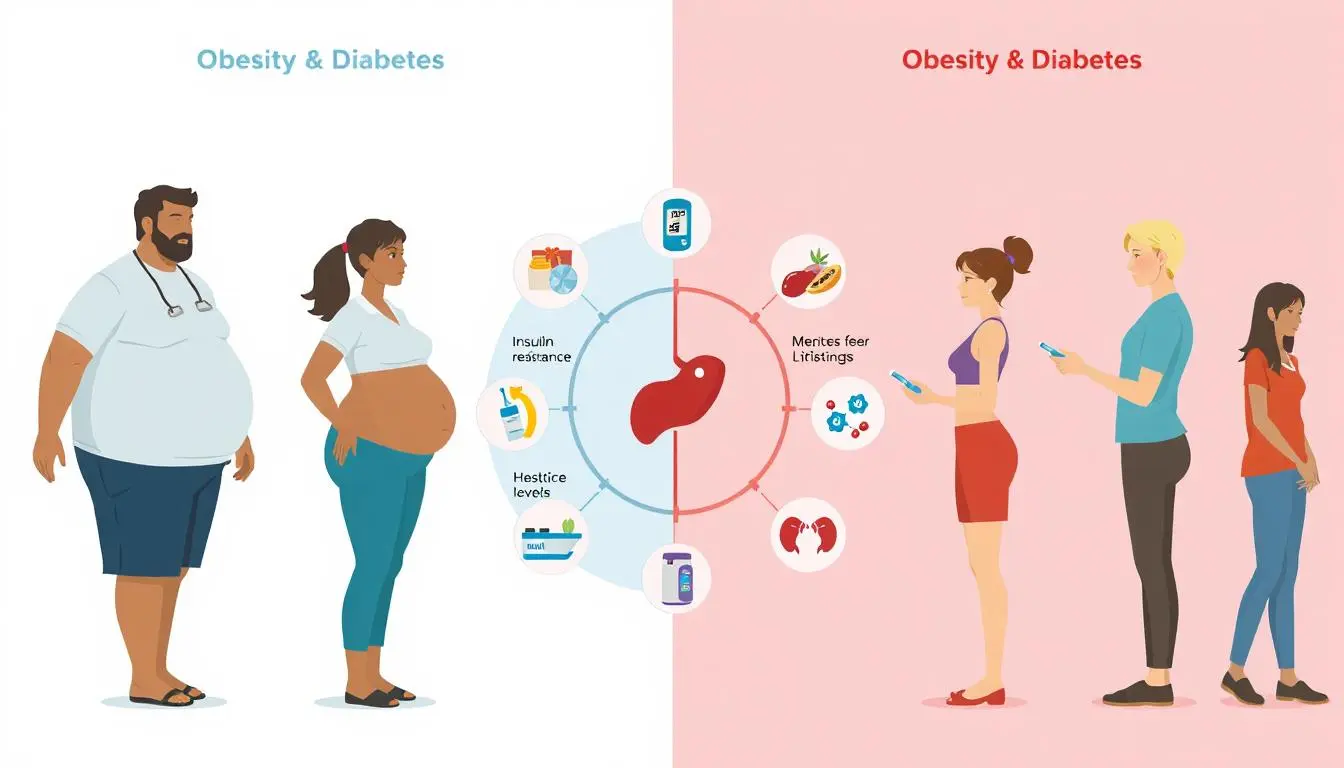Introduction to Obesity and Diabetes
Do you know that obesity and diabetes are closely linked? Obesity, a condition characterized by excessive body fat, can significantly increase the risk of developing type 2 diabetes. It’s important to understand how these two conditions intersect and the impact they can have on your health. By learning more about this connection, you can take proactive steps to prevent or manage diabetes if you are overweight.
Through this engaging guide, we will delve into the relationship between obesity and diabetes, explore the mechanisms behind this link, and discuss strategies for reducing your risk of obesity-related diabetes. Stay tuned to discover how you can make positive lifestyle changes to safeguard your health and well-being. Let’s take a journey together toward a healthier future!
Understanding the Link Between Obesity and Diabetes
Hey there! Ever wondered why obesity and diabetes seem to go hand in hand? Let’s dive into this fascinating connection. Obesity plays a significant role in increasing the risk of developing type 2 diabetes. When we carry excess weight, especially around the abdomen, it can lead to insulin resistance, where the body’s cells don’t respond effectively to insulin. This can result in high blood sugar levels, a key feature of diabetes. Moreover, obesity can also cause inflammation and hormonal imbalances that further contribute to diabetes development. Understanding this link is crucial for prevention and management. By maintaining a healthy weight through a balanced diet and regular exercise, you can significantly reduce your risk of developing diabetes. Stay informed, stay healthy!
Impact of Obesity on Diabetes Risk
Did you know that being overweight or obese significantly increases your risk of developing type 2 diabetes? It’s true! Obesity is one of the major risk factors for developing diabetes, as it can lead to insulin resistance and impaired glucose metabolism. When your body has excess fat, especially around the abdomen, it can disrupt the normal functioning of insulin, the hormone that regulates blood sugar levels.
Research has shown that individuals who are obese are more likely to develop diabetes compared to those who are at a healthy weight. This highlights the importance of maintaining a healthy weight through a balanced diet, regular physical activity, and overall healthy lifestyle choices.
If you are concerned about your risk of developing diabetes due to obesity, talk to your healthcare provider about developing a personalized plan to manage your weight and reduce your risk of diabetes. Remember, small changes can make a big difference in improving your health!
Mechanisms of How Obesity Contributes to Diabetes
Ever wondered how that extra weight around your waistline can increase your risk of developing diabetes? Let’s break it down. When you’re carrying excess weight, especially in the form of visceral fat (fat around your organs), it can lead to insulin resistance. Insulin is a hormone that helps regulate your blood sugar levels, but when you’re resistant to its effects, your body struggles to control blood sugar effectively.
Additionally, obesity can cause chronic inflammation in your body, which further impairs insulin sensitivity and contributes to the development of diabetes. Not only that, but obese individuals often have higher levels of fatty acids in their blood, which can interfere with insulin signaling.
By understanding these mechanisms, we can see how important it is to maintain a healthy weight to lower our risk of diabetes. Remember, small steps towards a healthier lifestyle can make a big difference in protecting yourself from this serious disease.
Strategies for Preventing Obesity-Related Diabetes
Hey there! So, you may be wondering how you can prevent obesity-related diabetes. Well, one key strategy is to maintain a healthy weight through a balanced diet and regular physical activity. By eating a variety of fruits, vegetables, whole grains, and lean proteins, you can keep your weight in check and reduce your risk of developing diabetes.
Another important aspect is staying active! Aim for at least 30 minutes of moderate exercise most days of the week. Whether it’s going for a brisk walk, hitting the gym, or dancing in your living room, find something you enjoy and stick with it.
Remember, small changes can make a big difference. So, start incorporating these strategies into your daily routine and take control of your health!
Treatment Options for Individuals with Obesity and Diabetes
Managing diabetes when you also have obesity can be challenging, but there are effective treatment options available to help you lead a healthy life. Consult with your healthcare provider to create a personalized plan that suits your needs. Here are some strategies that can help:
- Healthy Eating: Focus on a balanced diet rich in fruits, vegetables, whole grains, and lean proteins. Watch your portion sizes and limit sugary and high-fat foods.
- Regular Exercise: Incorporate physical activity into your daily routine. Aim for at least 30 minutes of moderate exercise most days of the week.
- Medications: Your doctor may prescribe medications to help manage your blood sugar levels and reduce the risk of complications.
- Weight Loss: Losing even a small amount of weight can improve your diabetes control. Work with your healthcare team to set achievable weight loss goals.
Remember, managing obesity and diabetes is a journey, but with proper care and support, you can take control of your health and well-being.
Future Research Directions in Addressing Obesity and Diabetes
So, what does the future hold in the battle against obesity-related diabetes? As researchers continue to delve into the intricate relationship between obesity and diabetes, exciting possibilities are on the horizon. One promising area of research involves exploring personalized medicine approaches that tailor treatments to individuals based on their unique genetic makeup and lifestyle factors. Additionally, advancements in technology, such as wearable devices and mobile health apps, are being utilized to promote healthy behaviors and monitor glucose levels in real-time.
By staying informed and actively participating in clinical trials or research studies, you can contribute to the ongoing efforts to combat obesity and diabetes. Remember, prevention is key, so maintaining a balanced diet, staying physically active, and seeking regular medical check-ups are essential steps in managing your health. Together, we can work towards a healthier future for all!


